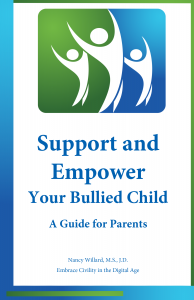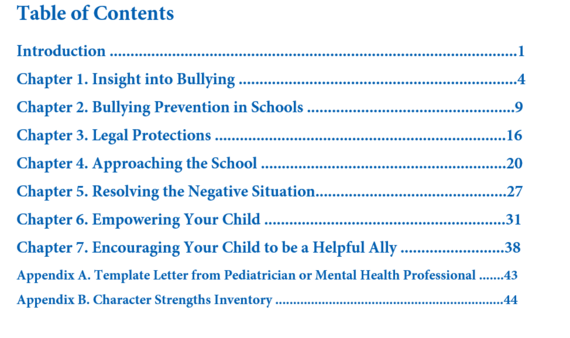Bullying is a little like the weather. Everyone complains but no one does anything about it. Well, that's not entirely true. Some adults try to stop or prevent bullying but, too often, they wind up failing or making things worse.
That's one of several important take-ways from Support and Empower Your Bullied Child: A Guide For Parents, a short (46 pages) but extremely useful eBook by Nancy Willard.
Willard, who runs the website EmbraceCivility.org, is a pioneer in the field of cyberbullying prevention. But, as she points out in the book, cyberbullying is less a specific form of bullying and more "a term that has been applied to a wide range of hurtful acts," including all of the other forms of bullying she describes: discriminatory harassment, sexual harassment, disrespect or denigration, relational aggression, conflict or "drama," physical harm or threat, dating abuse, retaliation, hazing, and accidental bullying such as jokes gone bad. Cyberbullying can also include distributing nude (sexting) images and, as she points out, "Digital technologies have characteristics that can be an advantage or disadvantage." A digital record that sticks around for a long time can cause long term hurt, but it can also provide evidence for helping to deal with the problem. And the fact that it can be seen by a wide audience, "can increase the sense of vulnerability of the one targeted or alert helpful allies and generate help."
I hope you're getting the sense that Willard understand the nuances of bullying. She understands that the motives of those involved are diverse and complex and that the response from adults needs to be thoughtful and not knee-jerk. She also warns that well-meaning adults can sometimes make things worse.
The book is aimed at parents who want to take a role as an advocate in helping their child deal with a bullying issue. And the word "advocate" was chosen carefully. As parents, it's our job to advocate for our children and sometimes it takes more than just a nudge to get what our children need from schools, agencies and other authorities that affect their lives. Willard also suggests that parents of children who are bullied can also engage in advocacy on behalf of all of the students in the school--to help the school community make the necessary changes to support their child as well as others.
Mistakes by well-meaning educators
I won't give way the whole book but an excerpt from the introduction will give you a feel for the way Willard worries that school personnel - despite their best intentions - can sometimes get it wrong when confronting a bullying issue.
- The principal may have indicated a very sincere concern about this situation and an intent to help make things better for your child. The problem is that what the school is doing simply does not seem to be making things better.
- Alternatively, you may have heard such comments as, "They were just joking." "Your child is overreacting." "Things like this happen. Your child needs to learn to deal with it." "If your child would stop (describe behavior), this wouldn't happen."
- Perhaps the principal may have punished the student or students being hurtful to your child, but this has only made things worse. Or other students are now being hurtful.
- Perhaps your child's own behavior and lack of social skills are part of the problem, but you do not know how to help your child make positive changes.
- Or worse, because students are constantly bullying your child in very subtle ways, your child got angry and lashed out in a more obvious way. So your child is the one who has been punished--which has only made the bullying of your child worse.
- Perhaps the source of hurtful attitudes that are leading to the bullying of your child are coming from other parents or the community or school staff.
- Perhaps, most of the hurtful acts are taking place online and the principal has told you, "off-campus, not our job."
Teachers who bully & why that resonates with me
In most cases, school staff really do try to support students, but Willard does acknowledge cases where adults, including teachers and other staff, can themselves bully or harass students. Adult-on-child bullying is one of the least spoken about aspects of the problem, but I know from experience that it can be devastating, I was bullied for years by a gym teacher who -- sadly -- taught at both my middle school and high school. As an overweight and not-too-athletic child, I was ridiculed and harassed by this teacher for years. As an adult, I lost the weight and got in shape but I could never "lose" the memory of what he did to me such as following me around the track and hitting my butt with the braided chain attached to his whistle. I knew about bullying back then but it never occurred to me to apply the term to the way this teacher was treating me.
Empowering youth
One of my favorite chapters explains how to "empower your child in gain greater self-confidence and resilience in the face of aggression, from peers or adults." In other words, even though parents and authorities have roles to play, often the children themselves are the best advocates. Based on research, which she (thankfully) cites, Willard concludes that "Students who are bullied, but who have supportive friends, experience less distress." Sometimes peer support can be more meaningful than parental support but parents can play a role in embracing and empowering that peer support.
Being different
Not all youth are at equal risk for bullying nor do all youth who are bullied respond in similar ways.
"The profile of students who are bullied is that of students who are 'different' in some way, such as having disabilities, perceived to have a different sexual orientation or identity, being obese, and, in some areas, racial or religious minorities." While differences can be celebrated, too often, being different, says Willard, is perceived as "deviant." But, she adds, "The social norms of a school community, as modeled by staff and student leaders, plays a key role in determining the extent to which some students are considered 'deviant.'
Why buy the book
There are three reasons why you should buy this book:
- It might have a big positive impact on your child's life. What's contained in these 46 pages could make a big difference in how you respond to a crisis and that could make a huge difference.

